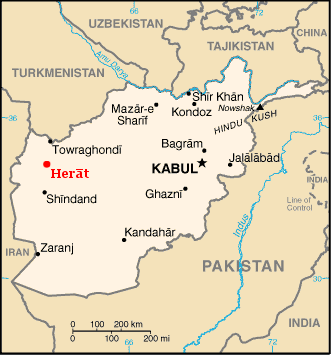Minds of the Movement
An ICNC blog on the people and power of civil resistance
by Ahmadullah ArchiwalAugust 11, 2021
President Biden’s decision to complete US troops’ withdrawal from Afghanistan by August 31 has elicited strong reactions at home and internationally. While opponents of the decision claim that it emboldens the Taliban and gives them a sense of victory, supporters hail the decision as an end to the long US engagement in Afghanistan. Regardless of the merits of either view, the fact remains that violence escalated across Afghanistan just after this announcement. The Taliban have increased their attacks throughout Afghanistan, in a few cities, and particularly in rural areas.

Credit: Public domain, via Wikimedia Commons
Herat, in the west of Afghanistan, was one of those cities. On August 3, the furious fighting there suddenly, and to the surprise of many, changed into a nonviolent dilemma action. It happened when ordinary Afghans began chanting Allahu-Akbar (“God is the Greatest”) loudly, publicly, and in increasing numbers.
Being Muslims, Afghans in this situation are qualified to chant Allahu-Akbar. It is not a strange slogan for Afghans—they chant these words in their daily prayers and at times when something amuses them. However, the Taliban, and other religious extremist groups like ISIS, consider themselves to have ownership over this slogan. Therefore, ordinary Afghans chanting this household name as they oppose the Taliban has become an act of defiance that puts the Taliban in a dilemma.
The situation began when Taliban and the Afghan security forces were engaged in vicious fighting in Herat. The Taliban were moments away from taking control of parts of the city, when some civilians joined hands with the government forces and took up arms to deny Talibans’ access to the city. The dynamics of the battlefield then changed in favor of the government security forces, and pro-government forces and the unarmed people in the general public were heard chanting slogans of Allahu Akbar.
Thereafter, the soon became a slogan of larger portions of the population in Herat and then in all the major cities of Afghanistan. We do not yet know exactly who first started chanting this slogan or whether the action was pre-planned or spontaneous. However, the dilemma action caused thousands of ordinary Afghans, who are otherwise silent spectators to the conflict in Afghanistan and feel powerless, to pour to the streets in Kabul, Herat, Nangrahar, Paktia, Khost, Bamyan, Parwan and many other provinces.
Still in infancy, the possession of the slogan has already put Taliban and the Afghan government at a loggerhead. President Ashraf Ghani, in a video message, claimed that the residents of Herat showed that they are the ones who represent the slogan, Allahu-Akbar.
While a limited number of Afghans use social media, they amplified the slogan worldwide by flooding Twitter and Facebook with tweets and Facebook posts tagged with #Allahu-Akbar. Because of different formats of this hashtag, it is difficult to determine the exact number of tweets and Facebook posts that have been made, but it is estimated that the hashtag has been used 250,000 times, including 150,000 tweets, in various social media conduits.
Afghan diaspora responded by decorating their cars and vans with the slogan in Europe, UK, Canada and the US. As is the case with other Facebook posts, each of these posts were responded to with numerous comments that included the slogan Allahu-Akbar.
Ordinary Afghans are now chanting the slogan overnight in many cities in protest of the Taliban. Thousands have also decorated their Facebook status with the slogan along with prominent individuals such as the former president of Afghanistan Hamid Karzai and other Afghan politicians, as well as former Canadian Ambassador.
Taliban have responded predictably, claiming that they own the slogan. A spokesperson for the Taliban, Zabihullah Mujahid, has reacted to the dilemma action and said: “that the slogan belongs to them and not to the seculars and slaves of the United States of America.”
Although the majority of the individuals taking part in this emerging campaign are youths, people of all age groups are participating. This a simple act has triggered huge mobilization and transformed, at least for the time being, the behavior of many passive individuals in Afghanistan. This dilemma action in Afghanistan strengthens the notion that nonviolent action crosses cultural and geographical limits and is possible in every situation.
The action further directly challenges the religious legitimacy of the Talibans’ fighting, which is critical if the Afghan government is going to turn the tide. Whether the dilemma action will continue the existing momentum remains to be seen. Proper organization and strategy are needed to transform the behavior of ordinary Afghans and end their passivity. But what we now know is that Allahu-Akbar triggered popular mobilization at a level that would have been unthinkable in Afghanistan ten days ago.

Ahmadullah Archiwal
Ahmadullah Archiwal has two MAs, one in journalism and mass communication from the University of Peshawar (Pakistan) and one in international affairs from the New School University in New York (USA), where he studied as a Fulbright scholar. Archiwal has done pioneering work on civil resistance and has authored three books—two on Khudai Khidmatgar, and one on nonviolent civic mobilization in Pashto.
Read More